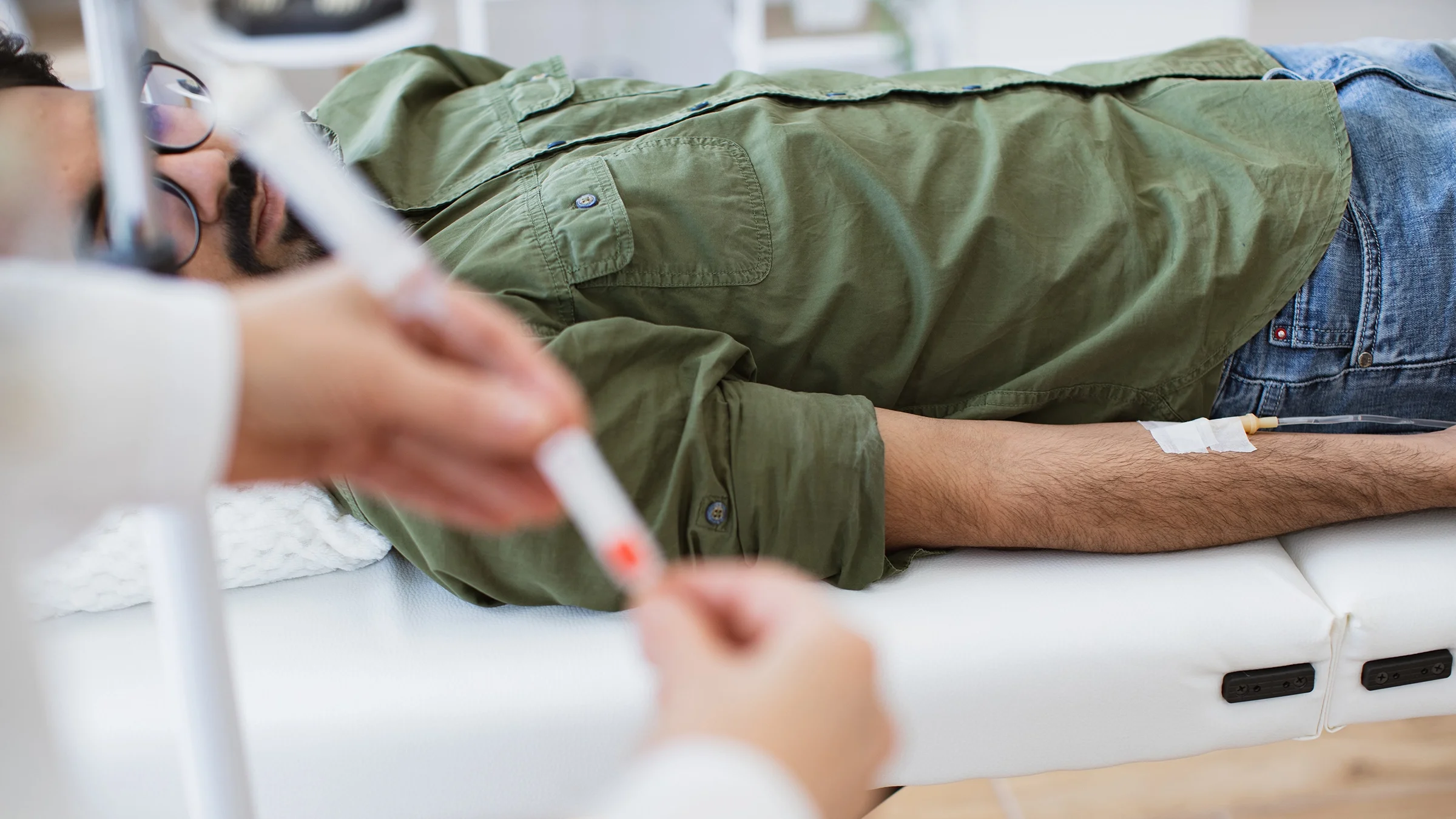Key takeaways:
Orencia (abatacept) is an injectable biologic medication. It prevents the activation of T-cells, which helps reduce the symptoms of certain autoimmune conditions.
Orencia can last for up to 125 days after your last dose. So you don’t need to take it every day. Instead, it’s typically given as a monthly IV infusion or weekly injections under the skin.
Your prescriber will see how you’re responding to Orencia after 3 months. But it can take up to 12 months to see its full effects. In rare cases, your body may develop antibodies to Orencia over time, which can prevent it from working as well.
If you’re eligible, a manufacturer savings card can help you get Orencia for as little as $5 per month. A patient assistance program is also available.
Save on related medications
Orencia (abatacept) is an injectable biologic medication. It treats different types of autoimmune conditions, including rheumatoid arthritis and psoriatic arthritis. It’s also used to help prevent acute graft-versus-host disease after a stem cell transplant.
Your prescriber or pharmacist will likely review information about Orencia’s side effects or drug interactions before you start taking it. But it’s common to have more complex questions, such as how long does Orencia stay in your body? Or how long will it take to start working?
Below are pharmacist-backed answers to these and more common questions about Orencia.
1. How does Orencia work?
Autoimmune disorders, such as rheumatoid and psoriatic arthritis, cause your immune system to go into overdrive. When this occurs, your immune system mistakes your healthy cells for a foreign invader (like germs) and starts attacking them. This attack leads to inflammation and tissue damage.
In the case of autoimmune arthritis, your immune system attacks the healthy cells in your joints. As mentioned, this leads to inflammation, which causes pain, swelling, and stiffness in the joint. The more inflammation in the body, the worse your arthritis symptoms tend to be.
Orencia helps calm an overactive immune system. It does this by preventing the activation of T-cells, which play a major role in causing inflammation. By blocking them from becoming active, Orencia helps reduce inflammation and prevent further joint damage.
2. How long does Orencia stay in your system?
Orencia stays in your body for quite some time after it’s administered. It can take anywhere from 40 to 125 days to fully clear it from your body after your last dose.
The goal of Orencia treatment is to keep the level of medication consistent in the body over time. Since it lasts for a long time in your body, you don’t need to take it every day the way you would a traditional tablet. Instead, how often you receive Orencia depends on the dosage form you’re prescribed.
Orencia comes as an infusion into a vein (IV) or a subcutaneous (under the skin) injection. After the initial doses, you’ll typically receive an IV infusion of Orencia once every 4 weeks. Subcutaneous doses contain a smaller amount of medication injected once a week.
3. How long does it take to see full effects from Orencia?
Chronic inflammation generally isn’t something that goes away after one treatment. You may notice your symptoms start to improve within 2 to 4 weeks of starting Orencia. But most people notice results after about 3 to 6 months of treatment. And it can take up to 12 months to see the full effects of Orencia treatment. This is based on clinical studies of the IV infusion used to treat rheumatoid arthritis. So it may differ depending on which form of Orencia you’re receiving and what health condition you’re treating.
4. How long do you need to take Orencia?
If you’re taking Orencia to manage arthritis, your treatment will usually last for at least 3 months. Your prescriber will determine whether to continue treatment based on your response and how well you’re tolerating Orencia.
In some cases, your prescriber may recommend reducing your Orencia dosage. They may do this if your arthritis symptoms resolve or stay at a low level of activity for at least 6 months (referred to as remission).
Side effects to consider: Learn about Orencia’s potential side effects — from infections to high blood pressure — and how to manage them.
Other biologics for rheumatoid arthritis (RA): Orencia is just one of many biologics used to treat RA.
Preparing for your infusion: Read expert-backed tips on what to expect during a biologic infusion.
The treatment course to prevent graft-versus-host disease involves four doses of Orencia over the course of 28 days. These doses are given on specific days based on when you receive your stem cell transplant.
5. Does Orencia stop working over time?
It isn’t common, but it’s possible that your body may develop antibodies (proteins made by your body's immune system) to Orencia over time. These antibodies can prevent Orencia from working as well as it used to. If this happens, you may notice the symptoms of your health condition returning or worsening.
If you feel that Orencia isn’t working as well as it once did at any time during your treatment, let your prescriber know. They can help determine if antibodies are an issue and if you need a different medication.
How to save on Orencia
There are ways to save on Orencia, which is only available as a reference (“brand-name”) biologic. GoodRx can help you navigate between copay savings cards and patient assistance programs to save money on your prescription:
Save with a copay savings card. If you have commercial insurance, you may be eligible to pay as little as $5 per month for Orencia using a savings card from the manufacturer.
Save with a patient assistance program. If you’re uninsured or underinsured and meet certain income requirements, you may be eligible for Orencia’s patient assistance program, which offers the medication at no cost.
The bottom line
Orencia (abatacept) is an injectable biologic medication. It treats certain forms of arthritis and other health conditions caused by an overactive immune system. Orencia works by blocking the activation of T-cells, a key step in the inflammation process.
Orencia lasts for a long time in the body (up to 125 days). So you’ll typically only need a dose once a month or once a week, depending on which dosage form you’re using.
It can take several months for Orencia to reach its full effect. For chronic conditions, your prescriber will likely check in after 3 months to decide if you should continue treatment.
In rare cases, your body may develop antibodies to Orencia that can make it less effective. So if you notice symptoms of your condition worsening or returning, be sure to let your healthcare team know.

Why trust our experts?



References
Drugbank Online. (2023). Abatacept.
Emery, P., et al. (2023). Sustained remission and outcomes with abatacept plus methotrexate following stepwise dose de-escalation in patients with early rheumatoid arthritis. Rheumatology and Therapy.
E.R. Squibb & Sons, L.L.C. (2024). Orencia-abatacept injection, powder, lyophilized, for solution [package insert].
Fraenkel, L., et al. (2022). 2021 American College of Rheumatology guideline for the treatment of rheumatoid arthritis. Arthritis Care and Research.
Genovese, M. C., et al. (2011). Subcutaneous abatacept versus intravenous abatacept: A phase IIIb noninferiority study in patients with an inadequate response to methotrexate. Arthritis and Rheumatism.
Malard, F., et al. (2023). Acute graft-versus-host disease. Nature Reviews Disease Primers.
MedlinePlus. (2024). Abatacept injection.
MedlinePlus. (2024). Autoimmune diseases.
Orencia. (n.d.). Frequently asked questions about Orencia.
Westhovens, R., et al. (2010). The efficacy and safety of abatacept in rheumatoid arthritis. Therapeutic Advances in Musculoskeletal Disease.














